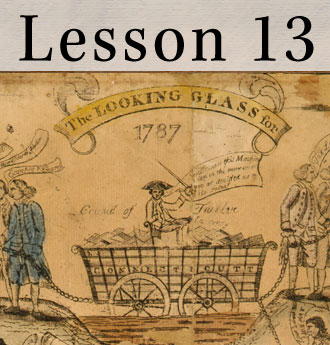The Resource Center » Level 3 » Unit 2 »
Lesson 13: What Was the Anti-Federalist Position in the Debate about Ratification?

Lesson Purpose
Lesson Objectives
- explain why the Anti-Federalists opposed ratifying the Constitution,
- explain the role of the Anti-Federalists in proposing a bill of rights and to identify other contributions their views have made toward interpreting the Constitution, and
- evaluate, take, and defend a position on the validity and relevance of Anti-Federalist arguments.
Lesson Terms
Lesson Biographies
Lesson Primary Sources
Anti-Federalist argument for a federal republic with authority resting in the state governments. Brutus argues that the provisions in the proposed constitution are general and comprehensive enough to endanger states with irrelevancy, with specific regard to the necessary and proper clause and the difficulty of a republic governing over diverse interests.






